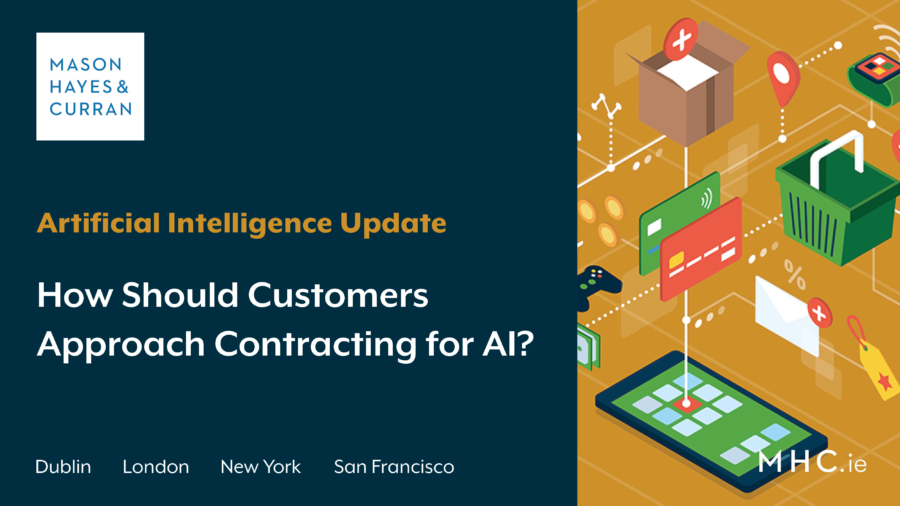How Should Customers Approach Contracting for AI?

As contracting for AI is at a relatively early stage, there is a degree of uncertainty on how to approach it. This is particularly the case when it comes to dealing with liability issues. Some suppliers may seek to take the approach that due to the potential unpredictability of outcomes when using an AI solution, they will not assume any liability arising from the AI. However, for the vast majority of customers this will simply not be good enough and will not be a basis on which they can contract.
So, what should customer parties do? There are three key issues:
- Due diligence and achieving transparency
- Accountability
- Testing, monitoring and oversight
Due Diligence and Transparency
In relation to due diligence, the key is to drill into the AI solution and establish where the real unpredictability lies. The aim is to separate the unpredictable from what is actually within a party’s control, be that party your contracting counterparty or a third party.
This process entails customers undertaking due diligence on the technology itself, in addition to their normal pre-contract due diligence on the supplier.
The customer should have a clear understanding of what the AI system can deliver before entering into contract negotiations. In our experience, this will be an iterative process and will typically require a degree of technical understanding from the customer party.
There can be a tendency to shy away from technical complexity. However, the only way the customer will be able to establish what elements of the system are within the supplier’s control, and what elements are not, will be to open the “black box” and get a clear view of how the system works.
The elements which are in the supplier’s control should be set out in the contract as things for which the supplier is responsible and therefore liable. This documented transparency is the outcome of the due diligence exercise.
Accountability
Achieving transparency leads then to the next issue - accountability. This is about getting into the granular detail in your contract on issues such as:
- the specification
- the deliverables
- where data comes from
- who owns any IP which might be developed
- what third parties are involved and who is responsible for them, etc.
This granular approach will often be the key to understanding responsibilities and therefore allocating liability via your contract.
On the specific issue of your liability clause, as with any IT contract, suppliers will seek to limit their liability via a limitation and exclusion of liability clause. This will be no different for AI contracts. The normal rules will apply, namely that the strength of the parties’ respective negotiating positions will be the key determinative factor in the drafting of any liability clause.
A key issue for customers is to ensure that the supplier is not seeking to exclude liability for matters which are actually in the supplier’s control and which the supplier should therefore be held accountable for.
A unique aspect of contracting for AI is dealing with liability arising from outcomes which are truly only in the control of the AI itself. However, in our experience, when the customer undertakes proper due diligence and achieves transparency and accountability this, in many cases, turns out not to be a significant issue.
Testing, monitoring and oversight
Where you have elements which are genuinely not in the control of a party then the issue is to ensure that the contract contains sufficient testing, reporting and audit rights to ensure that if an issue does arise, it is caught early and does not lead to a systemic problem. This approach will also give the customer visibility and will enable the customer to hold the supplier accountable where necessary.
Conclusion
In summary, what customer parties need to do is due diligence. Due diligence ultimately leads to transparency. In turn, transparency allows for accountability via your contract. Unpredictable risks which are identified through this process should then be managed through testing, monitoring and oversight.
Many issues can present themselves when contracting for AI and customer parties are advised to seek expert legal advice before concluding a contract. For more information on successfully contracting for AI, contact a member of our Technology team.
The content of this article is provided for information purposes only and does not constitute legal or other advice.
Share this:





